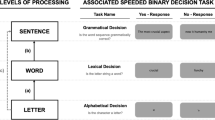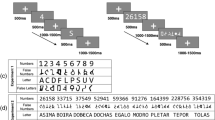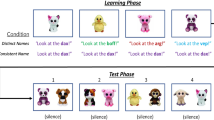Abstract
In standard models, word meanings contribute to reading words aloud and writing them to dictation1,2,3. It is known that categories of knowledge and the associated word meanings can be spared or impaired selectively4, but it has not been possible to demonstrate that category-specific effects apply to reading and writing. Here we report the case of a neurodegenerative patient with selectively spared numerical abilities whose brain damage left him able to read and write only number words.
This is a preview of subscription content, access via your institution
Access options
Subscribe to this journal
Receive 12 print issues and online access
$209.00 per year
only $17.42 per issue
Buy this article
- Purchase on Springer Link
- Instant access to full article PDF
Prices may be subject to local taxes which are calculated during checkout
Similar content being viewed by others
References
Ellis, A. W. & Young, A. W. Human Cognitive Neuropsychology (Lawrence Erlbaum Associates, Hove, Sussex, 1988).
Hillis, A. & Caramazza, A. Brain Lang. 40, 106–144 (1991).
Plaut, D., McClelland, J. L., Seidenberg, M. & Patterson, K. Psychol. Rev. 103, 56–115 (1996).
Warrington, E. Q. J. Exp. Psychol. 27, 187–199 (1975).
Zorzi, M., Houghton, G. & Butterworth, B. J. Exp. Psychol. Hum. Percept. Perform. 24, 1–31 (1998).
McCloskey, M. Cognition 44, 107–157 (1992).
Moss, H. E., Cappelletti, M., De Mornay Davies, P., Jaldow, E. & Kopelman, M. Brain Lang. 32, 350–354 (2000).
Hodges, J. R., Patterson, K., Oxbury, S. & Funnell, E. Brain Lang. 115, 1783–1806 (1992).
Snowden, J. S., Goulding, P. J. & Neary, D. Behav. Neurol. 2, 167–182 (1989).
Patterson, K. & Hodges, J. Neuropsychologia 10, 1025–1040 (1992).
Cipolotti, L. & Butterworth, B. J. Exp. Psychol. Gen. 124, 375–390 (1995).
Cipolotti, L. & van Harskamp, N. in Handbook of Neuropsychology 2nd. edn. Vol. 3 (ed. Berndt, R. S.) 305–331 (Elsevier Science, Amsterdam, 2001).
Dehaene, S., Dehaene Lambertz, G. & Cohen, L. Trends Neurosci. 21, 355–361 (1998).
Farah, M. J. & McClelland, J. L. J. Exp. Psychol. Gen. 120, 339–357 (1991).
Caramazza, A. & Shelton, J. R. J. Cognit. Neurosci. 11, 1–34 (1998).
Acknowledgements
This work was supported by grants from the Wellcome Trust and the Special Trustees of St. Thomas's Hospital, Kings' College London.
Author information
Authors and Affiliations
Corresponding author
Supplementary information
Rights and permissions
About this article
Cite this article
Butterworth, B., Cappelletti, M. & Kopelman, M. Category specificity in reading and writing: the case of number words. Nat Neurosci 4, 784–786 (2001). https://doi.org/10.1038/90484
Received:
Accepted:
Issue Date:
DOI: https://doi.org/10.1038/90484
This article is cited by
-
High-definition transcranial direct current stimulation (HD-tDCS) of the left middle temporal gyrus (LMTG) improves mathematical reasoning
Brain Topography (2023)
-
The neural and computational bases of semantic cognition
Nature Reviews Neuroscience (2017)
-
Laterality of anterior temporal lobe repetitive transcranial magnetic stimulation determines the degree of disruption in picture naming
Brain Structure and Function (2017)
-
Patterns of linguistic and numerical performance in aphasia
Behavioral and Brain Functions (2015)



